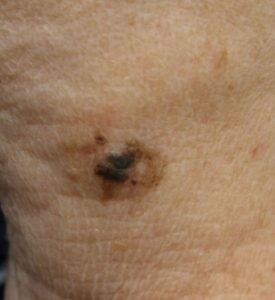Melanoma is a malignant tumour of melanocytes. Melanocytes are cells that produce the dark pigment, melanin, which is responsible for the color of skin. They predominantly occur in skin, but are also found in other parts of the body.
Melanoma is less common than other skin cancers, however it is much more dangerous as it can spread to other sites of the body more frequently than other skin cancers.
Early signs of melanoma are changes to the shape or color of existing moles such lesions should be referred without delay to a plastic surgeon. At later stages, the mole may itch, ulcerate or bleed. Early signs of melanoma are summarized by the mnenomic “ABCDE”:
Asymmetry
Borders (irregular)
Color (variegated), and
Diameter (greater than 6 mm)
Evolving over time
Visual diagnosis of melanomas is still the most common method employed by health professionals.
Mr Stanley Loo is a specialist in the management of melanoma’s. He will fully asses the lesion and all other areas of potential spread at the initial consultation.

Treatment of melanoma’s are primarily surgery however other treatments may be beneficial in certain cases (Mr Loo will explain this to you in the consultation at Auckland Plastic Surgery Group, Unit 6 / 31 Highbrook Drive, Highbrook, Auckland 2013 and perform the surgery at either Auckland Plastic Surgery Group, Kakariki Hospital or Ormiston Hospital). Diagnosis is confirmed with an excisional biopsy (small surgical procedure). If the diagnosis of melanoma is confirmed further investigations may be required.
The risk of spread of melanoma is determined by many factors of which the thickness of the melanoma is a major factor. A wide local excision is recommended in all melanoma’s, the margin of which is determined by the thickness. In melanoma’s which have an intermediate thickness (between 1 – 4 mm) an additional procedure called a “sentinel node biopsy” is also recommended.
In cases where there is spread to other areas, Mr Stanley Loo will discuss the treatment plan in the consultation.
Regular follow up is very important in the long term management of melanoma and should be done by an appropriate health professional. Mr Loo will follow you up at his rooms (East Care, Botany, Auckland) and arrange all appropriate investigation as required.
If you would like to discuss this further a consultation can be made with Mr Stanley Loo at Auckland Plastic Surgery Group, Unit 6 / 31 Highbrook Drive, Highbrook, Auckland 2013 Ph (09) 220 2580